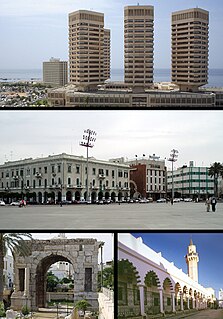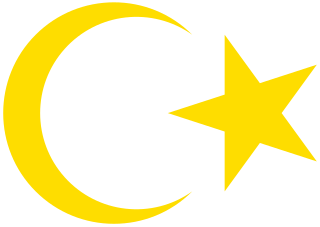
Since 2011, Libya currently does not have an official coat of arms. The Constitutional Declaration issued by the National Transitional Council on August 2011 defines the flag of Libya, but does not make any provisions for a coat of arms.

Libya–Russia relations is the bilateral relationship between the two countries, Libya and Russia. Russia has an embassy in Tripoli, and Libya has an embassy in Moscow. Diplomatic contact between Russia and Libya has generally been close and productive; seeing as both countries have had and continue to see volatile relations with the United States. Leader Muammar al-Gaddafi was a close ally of the Soviet Union, despite his country's membership in the Non-Aligned Movement; also Russia regarded Libya as one of its strongest allies in the Arab world. After the Libyan Civil War Russia has supported stabilizing the country, and since the outbreak of the new conflict it has primarily backed the Tobruk-based Council of Deputies over the UN-backed Government of National Accord and various other factions.

The National Transitional Council of Libya, sometimes known as the Transitional National Council, was the de facto government of Libya for a period during and after the Libyan Civil War, in which rebel forces overthrew the Libyan Arab Jamahiriya of Muammar Gaddafi. The NTC governed Libya for a period of ten months after the end of the war, holding elections to a General National Congress on 7 July 2012, and handing power to the newly elected assembly on 8 August.

The Cabinet of Libya serves as the leadership for the executive branch of the government of Libya.
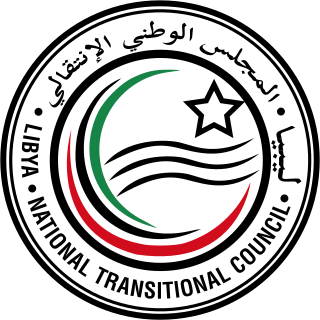
The aftermath of the Libyan Civil War has been characterized by marked change in the social and political order of Libya after the overthrow and killing of Muammar Gaddafi in the 2011 Libyan Civil War. The country has been subject to ongoing proliferation of weapons, Islamic insurgencies, sectarian violence, and lawlessness, with spillovers affecting neighboring countries including Mali.
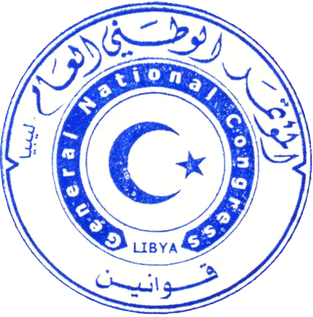
The General National Congress was the legislative authority of Libya for two years following the end of the First Libyan Civil War. It was elected by popular vote on 7 July 2012, and took power from the National Transitional Council on 8 August.

The Second Libyan Civil War is an ongoing conflict among rival factions seeking control of the territory and oil of Libya. The conflict at the beginning was mostly between the government of the House of Representatives (HoR) that was controversially elected in 2014, also known as the "Tobruk government"; and the rival General National Congress (GNC) endorsed government, also called the "National Salvation Government", based in the capital Tripoli, established after Operation Odyssey Dawn and the failed military coup.

The House of Representatives (HoR) is a legislature of Libya. As part of the ongoing Libyan Civil War, it represents the "Tobruk government" based in the east of the country.

The National Salvation Government was a government body formed by politicians from the General National Congress's blocs that lost the June 2014 elections in Libya. The NSG was led by Khalifa al-Ghawi. The term Libya Dawn Coalition was used to refer to the armed groups and/or the wider political movement supporting the NSG. The NSG was one of the major sides in the ongoing Second Libyan Civil War from its formation August 2014 until its dissolution in April 2016.

The Libyan Crisis refers to the ongoing conflicts in Libya, beginning with the Arab Spring protests of 2011, which led to a civil war, foreign military intervention, and the ousting and death of Muammar Gaddafi. The civil war's aftermath and proliferation of armed groups led to violence and instability across the country, which erupted into renewed civil war in 2014. The ongoing crisis in Libya has so far resulted in tens of thousands of casualties since the onset of violence in early 2011. During both civil wars, the output of Libya's economically crucial oil industry collapsed to a small fraction of its usual level, with most facilities blockaded or damaged by rival groups, despite having the largest oil reserves of any African country. U.S. President Barack Obama stated on 11 April 2016 that not preparing for a post-Gaddafi Libya was probably the "worst mistake" of his presidency.
The following lists events that happened during 2007 in Libya.
Khalifa al-Ghawil, sometimes transliterated as Khalifa al-Ghweil or Ghwell, is a Libyan politician. He was the prime minister of the General National Congress-led National Salvation Government in Tripoli.
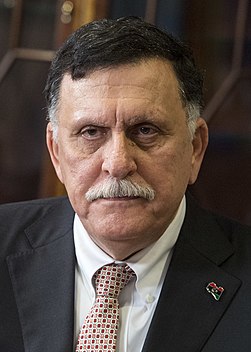
Fayez Mustafa al-Sarraj is the Chairman of the Presidential Council of Libya and prime minister of the Government of National Accord (GNA) of Libya that was formed as a result of the Libyan Political Agreement signed on 17 December 2015. He has been a member of the Parliament of Tripoli.

The Presidential Council of Libya is a body formed under the terms of the Libyan Political Agreement which was signed on 17 December 2015. The Council carries out the functions of head of state of Libya and is to take command of the Libyan National Army. The agreement has been unanimously endorsed by the United Nations Security Council which welcomed the formation of the Presidency Council and recognized that the Government of National Accord is the sole legitimate executive government of Libya. The Presidential Council presides over the Government of National Accord.
This is detailed a timeline of the Libyan Civil War (2014-present).
Al-Mahdi Al-Barghathi is a Libyan National Army officer who served as the Minister of Defense in the Libyan Government of National Accord, from January 2016 until July 2018. He is an army commander from eastern Libya who had formerly served under General Khalifa Haftar during the Second Libyan Civil War before joining the internationally-recognised unity government.

Mohamed Taher Siala is a Libyan politician who currently serves as the Minister of Foreign Affairs of Libya in the Government of National Accord.
Clashes took place in West Libya since 14 October 2016. A coup d'état attempt was conducted by the former head of the National Salvation Government Khalifa al-Ghawil against Prime Minister Fayez al-Sarraj, the head of Libya's GNA Government.

The 2019 Libyan general election will be held in Libya sometime in early 2019, potentially by June though they were originally expected to be held on 10 December 2018.


